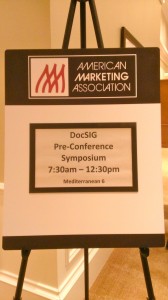
We had a great group of PhD students and professors attend DocSIG’s pre-conference symposium at the Winter Educator’s Conference (“Winter AMA”) in Orlando, held February 21, 2014. The symposium theme was “What I Wish I Had Known As a Young Scholar” and covered everything from starting the dissertation all the way through applying for tenure.
To help give you a feel for what we covered, we’ve included some of the key takeaways from the professors along with their presentation decks if they had one.
Starting the Dissertation
Doug Chung (Harvard University)
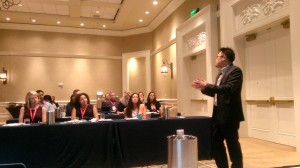
- The dissertation is a roller coaster. The only good fuel is passion. 95% of your time should go into your dissertation.
- In planning your dissertation, strive for state-of-the-art methodological techniques and important, relevant questions. Being the “first” to do something does not necessarily make it valuable.
- If you’re still early as a doctoral student, don’t take the easy route. Take demanding, rigorous courses from economics, psychology, and statistics to develop the fundamental skills. Without skills, you’ll continue to be hurt even after you get a job.
Beth Walker (Arizona State)
- The time after comprehensive exams can be called “The Black Hole” or “The Devil’s Triangle.” Time without structure can be a plus/minus. Set aside a certain number of hours per day – maybe 5 hours, to spend writing your dissertation. Don’t give up those hours. If you have one great paragraph at the end of 5 hours, that’s OK. You just want to avoid having any “Zero Days.”
- Read widely and read across disciplines. This is where the most insight comes from. But force yourself to write, because reading becomes the easy part. The other benefit to writing frequently is that advisors need something to react to. Talking becomes unproductive.
- Meet with your advisors regularly. Give them something to read and offer feedback on.
- Remember that this will be a very special time. You will never have this much time to focus on your research and skill development.
Choosing a Committee & Defending the Proposal/Dissertation
Michael Ahearn (University of Houston)
- Pick a topic you can sell to people with different research areas and methods.
- A “strategy of success” is working on things that your advisor/committee are already successful with. Anything else should be considered a high-risk move.
- When you hit the job market, you should be significantly far along on your dissertation (at least one essay that is “clean”).
John Hulland (University of Georgia)
-
- When choosing a committee, pick members who are committed to giving you feedback, seeing you get done quickly, who work well together, and who add some sort of value, whether it be methodological, conceptual, substantive, supportive, or reputational.
- Give your advisor material to work with – if you can get the table/figure right, this is something very concrete to work with and getting that solidified is the first step to having the paper write itself.
- Remember that a successful dissertation is one that gets you the degree. Publication is just gravy. If you have taken true ownership of your topic and dissertation, YOU are the expert.
- Manage your timelines. Defend your proposal before you go on the job market. Have a final draft version of your dissertation in the hands of your committee 3 weeks before your submission date (submission is often 2-3 weeks before the actual defense date).
Applying for Jobs
Neil Morgan (Indiana University)
-
- Be realistic about the job market. Don’t limit yourself geographically. This seems to be the main reason that candidates don’t work out.
- Target your schools and prioritize your letters. You can’t effectively personalize 150 letters, so “bucketize” and personalize your top schools.
- Start looking at vitas NOW. There are huge variations in quality, so look at who is getting the kind of jobs you want and what their vitas look like. Hirers are looking for quality signals in terms of education, research and publications, teaching experience and ratings, interests, and even past work experience.
- Remember that you’re looking for your first job, not your last. Go some place where you feel like you will learn something and where you’ll be more valuable if you ever decide to leave. Who can you work with effectively?
Geraldine Henderson (Rutgers University)
-
- While on the market, it is extremely important to stay organized.
- Be wary of your advisor’s well-meaning desire to see you to the very best school possible. Go where you’re going to be happy. It’s okay to consider professional factors AND personal factors when choosing schools. Things can and do work out even if you apply to a limited number.
- Don’t go onto the job market until you are ready. “Ready” means having refereed journal articles, having more expertise in your area than anybody, having defended your proposal and your advisor signing off on your preparedness.
Summer AMA and Campus Interviews
P.K. Kannan (University of Maryland)
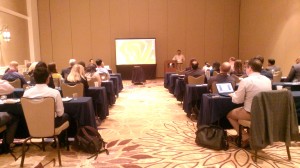
- Search committees are looking for a few things: (1) how good is your research, (2) how well can you teach (3) how well do you respond to questions, and (4) how deep can you go within your topic. Remember that interviews are sales pitches; focus on being polished and achieving intellectual “depth.”
- Remember to present to the whole audience, not just to the group of researchers that shares your methodology.
DocSIG/TechSIG Joint Session
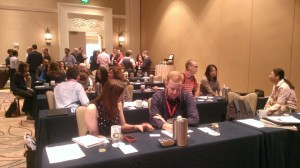
DocSIG seeks to expose its members to a variety of opportunities, so the DocSIG and TechSIG came together for a joint session entitled, “What Makes Academic Research Catch On?”. Members of each SIG formed groups and generated catchy title ideas for academic papers related to gamification. After a brief brainstorming session, each group announced its title idea. This session allowed members of both SIGs to network in an informal atmosphere and it seemed like a good time was had by all!
Dip Biswas (University of South Florida)
- Remember that schools are generally doing 20-25 interviews at AMA. What would make you more salient in the mind of the search team? Find something about yourself to stay memorable (in a good way).
- Make some scheduling tweaks that give you an advantage. Arrive early to Summer AMA so you can get a feel for the hotel and layout. Also, keep a time slot open before a desirable school interview so you can be relaxed and confident (most of his campus visits were from early morning time slots).
Surviving the First Year at the First Job
Natalie Mizik (University of Washington)
-
- Teaching is an important part of the job of a professor. You must know how to teach so that you can do good research (efficiency).
- Tips for teaching: (1) learn the local culture; students on one coast may be very different from students on the other, (2) borrow everything you can to support your teaching, including lecture slides, examples, best practices, homework assignments–don’t try to reinvent the wheel, (3) identify students in the classroom that you can use as tools to accomplish certain things like keep conversations alive, provide insight, diffuse situations.
Christine Moorman (Duke University)
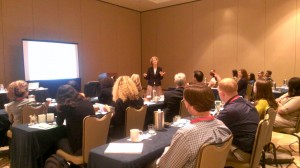
-
- Thriving (versus striving) is about prioritizing. There will be constant demands on your time. Find your hardest problems and work on those during your productive time. Don’t be afraid to say no. You have to invest selectively. Just don’t say no all the time or you’ll be a bad colleague.
- Learn to be a research “closer.” New projects are always alluring, but you need to be focused on what needs your attention to move current projects along in the process.
- Don’t worry about being a perfect teacher. Invest and improve over time. People who try to improve and who care will become better.
- Remember that a first-year professor is a a colleague and an emerging scholar. You should not be viewed as “less than” the other faculty.
Christine Moorman- First Year Out from AMA DocSIG
Applying for Tenure
Ajay Kohli (Georgia Institute of Technology)
- Learn what kind of model your school uses when assessing publications, whether it be an additive model (every paper contributes to your total) or an averaging model (lower-grade journals bring down your average).
- Tenure is about demonstrating intellectual independence, which you can do through having first-author papers, papers with those other than your dissertation chair, and multiple co-authors. Being known for multiple things is very, very hard. Try to be known for at least one thing.
Kevin Lane Keller (Dartmouth University)
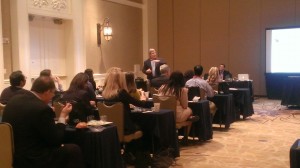
-
- Invest heavily during the doctoral program. This time is a great time to invest in skills, take courses, develop academic stamina and curiosity, and embrace the power of models.
- Be careful with your time. It is made up of nickels and dimes and will unfocused time adds up. You may want to wait until after tenure to do any consulting, for example.
More symposium photos are available on Facebook.
Thank you again to our outstanding speakers and dedicated attendees. We look forward to seeing you at future DocSIG events!
